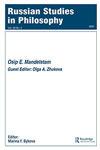Orthodoxy and the Soviet Regime: From Conflict to Adaptation
IF 0.1
4区 哲学
Q4 Arts and Humanities
引用次数: 0
Abstract
ABSTRACT The Soviet authorities applied the most rigid model of state–confessional relations—segregation—to the Russian Orthodox Church. They emphasized the complete exclusion of the church from public life and its subsequent liquidation. By 1919 the Church was already publicly avoiding conflict with the Soviet authorities; its attempts at adaptation, however, were unsuccessful. By 1939, the church organization in the Soviet Union was practically eliminated, though the majority of the population still believed in God. This fact, as well as foreign-policy interests and the loyalty to the state exhibited by the majority of believers during the war, led to a softening of the segregation model and to the church’s adaptation to operating within the Soviet state.东正教与苏维埃政权:从冲突到适应
苏联当局将最严格的国家-宗教关系模式——种族隔离——应用于俄罗斯东正教。他们强调要把教会完全排除在公共生活之外,并在随后进行清算。到1919年,教会已经公开避免与苏联当局发生冲突;然而,它的适应尝试并没有成功。到1939年,苏联的教会组织几乎被消灭了,尽管大多数人仍然信仰上帝。这一事实,以及外交政策利益和大多数信徒在战争期间表现出的对国家的忠诚,导致了隔离模式的软化,教会适应了在苏联国家内的运作。
本文章由计算机程序翻译,如有差异,请以英文原文为准。
求助全文
约1分钟内获得全文
求助全文
来源期刊

RUSSIAN STUDIES IN PHILOSOPHY
PHILOSOPHY-
CiteScore
0.10
自引率
0.00%
发文量
14
期刊介绍:
Russian Studies in Philosophy publishes thematic issues featuring selected scholarly papers from conferences and joint research projects as well as from the leading Russian-language journals in philosophy. Thematic coverage ranges over significant theoretical topics as well as topics in the history of philosophy, both European and Russian, including issues focused on institutions, schools, and figures such as Bakhtin, Fedorov, Leontev, Losev, Rozanov, Solovev, and Zinovev.
 求助内容:
求助内容: 应助结果提醒方式:
应助结果提醒方式:


